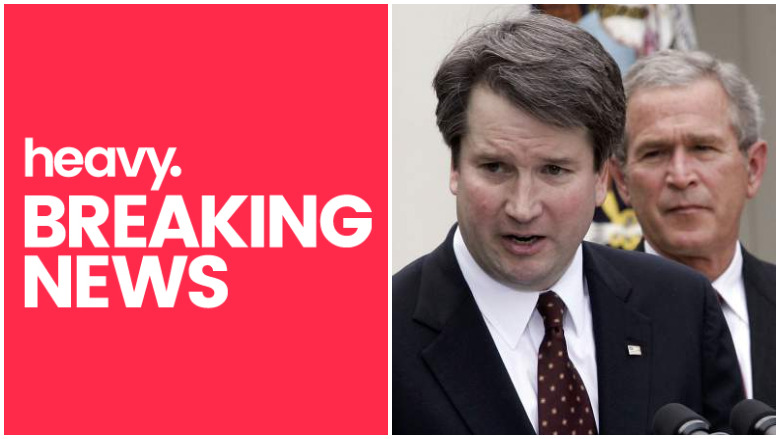
Brett Kavanaugh, a former George W. Bush administration official turned federal judge, is now President Donald Trump’s nominee for U.S. Supreme Court. Kavanaugh has written that he doesn’t think sitting presidents should be indicted – or even investigated – for any crime while in office.
Trump took his decision-making down to the wire, stoking the drama, and The New York Times and others reported that he has narrowed the choices down to Kavanaugh and federal Judge Thomas Hardiman. Trump then announced that he had chosen Kavanaugh.
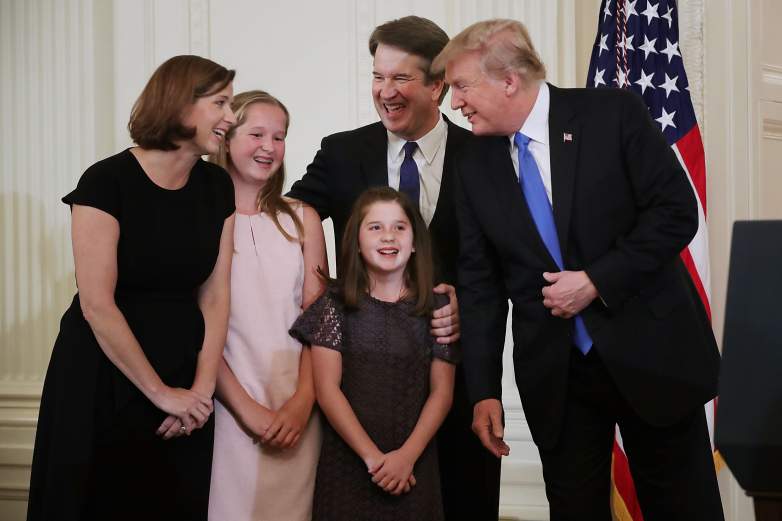
Getty U.S. President Donald Trump (R), Judge Brett M. Kavanaugh (2nd R), his wife Ashley Estes Kavanaugh and their daughters, Margaret and Liza, share a laugh after Trump announced the judge as his nominee to the United States Supreme Court during an event in the East Room of the White House July 9, 2018 in Washington, DC.
One angle that is worth exploring in Brett Kavanaugh’s background: What he wrote about whether a sitting president can be indicted/charged with a crime. With the Robert Mueller investigation still looming large, some wonder the degree to which Kavanaugh’s written beliefs on that core question could influence the president.
More than any of the other candidates, Kavanaugh has been front-and-center when it comes to such constitutional questions, as he helped author the Ken Starr report and was involved in impeachment proceedings against former President Bill Clinton. However, he later had a change of heart about such investigations against a sitting president, saying they are too distracting. As Brett Kavanaugh served in the George W. Bush administration following his service to Starr, it appears that experience helped change his mind.
Here’s what you need to know:
Trump’s Team Reviewed Brett Kavanaugh’s Writings on the Topic, Reports Say
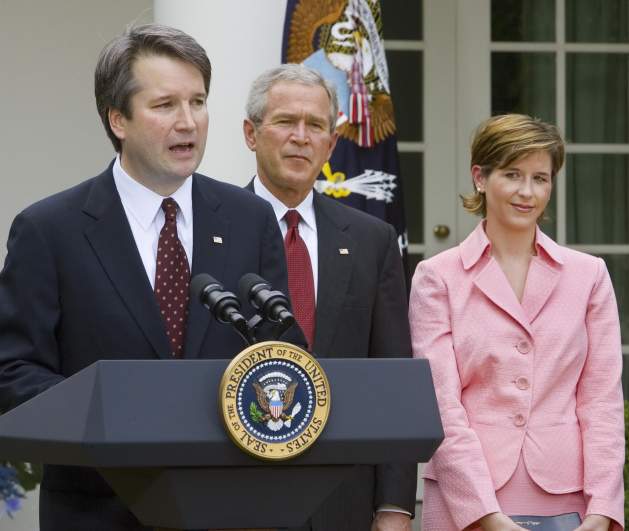
GettyBrett Kavanaugh, Then-President George Bush, and Ashley Kavanaugh in 2006
According to CNN’s Jim Acosta, Trump’s team expressed interest in Brett Kavanaugh’s writings on the indicting a sitting president question as the choice for SCOTUS loomed.
“Trump SCOTUS team has looked at Kavanaugh’s past comments on indicting a sitting president, we’ve confirmed. In 2009, Kavanaugh wrote: ‘The indictment and trial of a sitting President, moreover, would cripple the federal government…'” Acosta wrote on Twitter on July 9, 2009.
Democrats have taken note of the writings, with New York Democratic Senator Chuck Schumer tweeting, “Kavanaugh has taken numerous positions that question his ability to be an indep. check on @POTUS, saying investigations of presidents should be deferred while in office & a president needn’t obey it when he ‘deems the law unconstitutional.’”
What Brett Kavanaugh Wrote
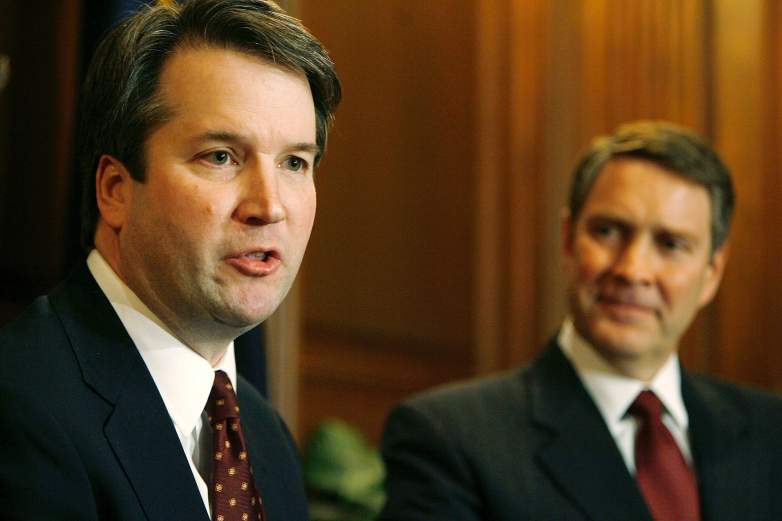
GettyBrett Kavanaugh (left) in 2004.
You can see what Brett Kavanaugh wrote on the question here.
The article ran in the Minnesota Law Review in 2009, and it’s titled, “Separation of Powers During the Forty-Fourth Presidency and Beyond.” In the article, he argues that various controversies bogging down the Bill Clinton and George W. Bush presidencies stressed the country’s “system of separation of powers and checks and balances.”
One of the headers in Kavanaugh’s article reads, “PROVIDE SITTING PRESIDENTS WITH A TEMPORARY DEFERRAL OF CIVIL SUITS AND OF CRIMINAL PROSECUTIONS AND INVESTIGATIONS.” Kavanaugh began that section by explaining the difficulties faced by any president. “The decisions a President must make are hard and often life-or-death, the pressure is relentless, the problems arise from all directions, the criticism is unremitting and personal, and at the end of the day only one person is responsible,” he wrote.
Kavanaugh concluded, “I believe it vital that the President be able to focus on his never-ending tasks with as few distractions as possible. The country wants the President to be ‘one of us’ who bears the same responsibilities of citizenship that all share. But I believe that the President should be excused from some of the burdens of ordinary citizenship while serving in office.”
Kavanaugh indicated he felt differently in the 1980s and 1990s but now regarded his beliefs then as a “mistake.”
“Looking back to the late 1990s, for example, the nation certainly would have been better off if President Clinton could have focused on Osama bin Laden without being distracted by the Paula Jones sexual harassment case and its criminal investigation offshoots,” Kavanaugh wrote.
He then called for civil actions against a president to be deferred for the course of a president’s term. He wanted to extend that protection to criminal prosecution too. “In particular, Congress might consider a law exempting a President – while in office – from criminal prosecution and investigation, including from questioning by criminal prosecutors or defense counsel,” Kavanaugh wrote, decrying such investigations as “inevitably politicized.”
Even criminal investigation is too distracting, wrote Kavanaugh, adding, “The indictment and trial of a sitting President, moreover, would cripple the federal government, rendering it unable to function with credibility in either the international or domestic arenas.”
Kavanaugh wrote that Congress can provide the check on wrongdoing by a president. “A second possible concern is that the country needs a check against a bad-behaving or law-breaking President,” he wrote. “But the Constitution already provides that check. If the President does something dastardly, the impeachment process is available. No single prosecutor, judge, or jury should be able to accomplish what the Constitution assigns to the Congress.”
Brett Kavanaugh Was a Principal Author of the Starr Report & Argued for Broad Impeachment Powers
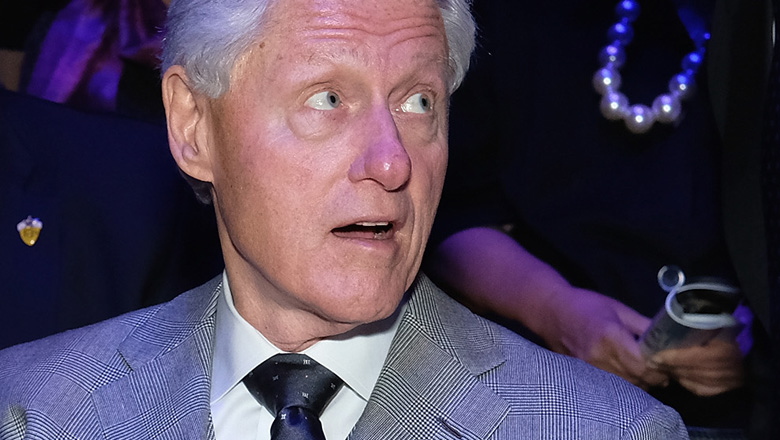
GettyBill Clinton attends The Nearness Of You Benefit Concert at Jazz at Lincoln Center on January 25, 2017 in New York City.
Kavanaugh, as he acknowledged in the article, didn’t always feel that way. In fact, he was indeed front-and-center in the investigations into former President Bill Clinton over sexual harassment and his honesty about a relationship with an intern.
Kavanaugh was a “lead author” of Ken Starr’s report into Bill Clinton, according to Politico. Kavanaugh, a graduate of Yale University, also worked in the George W. Bush administration and clerked for Anthony Kennedy, before he was named by Bush to the federal bench.
Indeed, Kavanaugh once argued for broad impeachment powers against a president, according to The New York Times, which reported that he thought a president should be impeachable for “lying to his staff and misleading the public.” Those arguments appear in the Starr Report, The Times reported. In 1998, Clinton was, in fact, impeached.